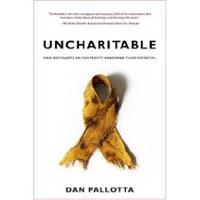After mulling over the central idea contained within Dan Pallotta’s revolutionary new book Uncharitable for a few days, there is something in it that worries me.
At first I thought his argument was very good – essentially that charities should be able to operate under exactly the same rules as private companies: paying staff whatever it takes to attract the best talent; advertising as freely as they wish in order to generate wider awareness and raise more money, and raising capital on the stock market. As Pallotta points out, it seems crazy that people can make enormous profits out of activities that potentially damage society or the environment, yet anyone that wants to make the world a better place is denied the same tools and rewards.
But if the global economic events of the last year or so have shown us anything, it’s that unfettered pursuit of profit is a mighty dangerous thing. It’s not unimaginable that if the charitable sector was able to indulge in the same money-making models and systems that the capitalists do, it could find itself just as vulnerable not only to the cycle of boom and bust, but also to the runaway greed of individuals for whom self-interest is paramount, and – riskiest of all – plummeting public regard when things go wrong. Where would beneficiaries be then?
I don’t think there’s any doubt charities are hamstrung by the present ‘economic apartheid’ they are currently subject to, but to simply give them all the same opportunities and freedoms as the private sector could be catastrophic. I think the restraints they presently operate under should definitely be re-examined in light of Pallotta’s thesis, but perhaps we’ll find they afford quite a lot of protection against the vagaries of the markets – and the donating public.










